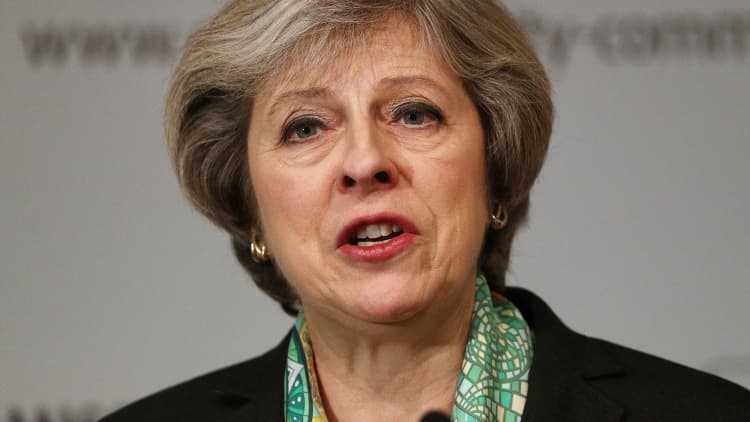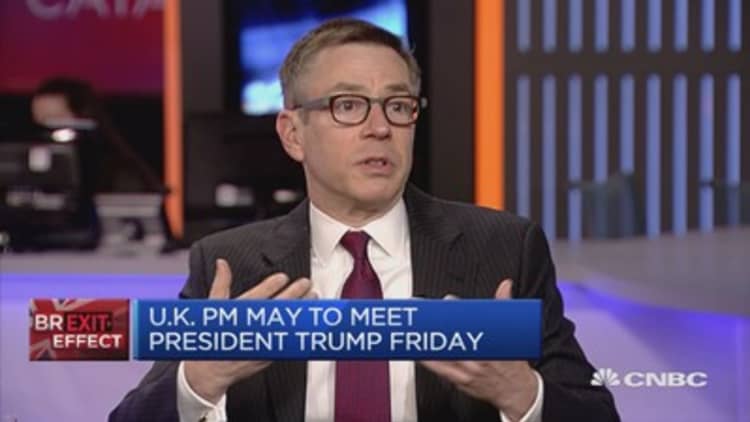
The U.K.'s Prime Minister Theresa May is meeting U.S. President Donald Trump this Friday. Both leaders have talked about strengthening the "special relationship" between the two nations and Friday's meeting could lead to an announcement on a free trade deal – a move that could have strong repercussions on the U.K.'s exit negotiations with the EU.
CNBC takes a look at what this trade deal could be like and its implications.
What to expect from Friday’s meeting?
The first item on the press statements will be about demonstrating "a willingness to move forward with a free trade deal," Rem Korteweg, senior research fellow at the Center for European Reform, told CNBC via telephone.
"There's been a lot of flattering comments from both sides. They want to move quickly (on trade)," he added.
Despite his protectionist rhetoric, U.S. President Donald Trump rebuffed comments from his predecessor that the U.K. would be at the back of the queue for a trade deal. Instead, President Trump wants to deepen ties with the U.K.
Prime Minister May is the first world leader to visit the White House under the Trump administration. She is looking to strengthen alliances with other countries as the U.K. prepares to leave the European Union, avoiding isolation fears.
Who would benefit the most from a deal?
It's all about the detail and to how far Trump and May want to go.
"I don't expect a detailed discussion tomorrow. It's about deciding whether or not the U.K. and the U.S. want a trade deal and when," Andre Sapir, senior fellow at Bruegel, told CNBC on Thursday.
He added, that usually, the smaller economy, in this case the U.K., has more to gain with a trade deal.
But a free trade deal between both countries could be more about political symbolism than anything else and thus easier to conclude.
"(A trade deal) will help President Trump to stave off some criticism that he is anti-trade," CER's Korteweg said. "It works very nicely for Prime Minister May too because she can show there's life outside the EU," he added.
Both countries already enjoy significant deep trade ties. In fact, in 2015, the U.K. ran a trade surplus in goods and services with the U.S. However, they could still lower some of the remaining tariffs or indeed opening up other sectors, such as health care and agriculture, which could be controversial and time costly.
What could be the basis for a deal?
If both countries try to get a comprehensive agreement – the more controversial and costly option – the U.S. would ask the U.K. to open up its pharmaceutical and health sector. This would be a "real concern and not just for Labour," Korteweg told CNBC.
During trade negotiations between the EU and the U.S., the U.K. was always campaigning to protect its health system. The same would happen to agricultural issues.
Meanwhile, the U.K. would want America to open up on procurement – another sensitive topic, given the amount of U.S. regulation, Korteweg said.
Independently of the route they take, the U.S. and the U.K. could use the Trade Transatlantic Investment Partnership (the so-called TTIP) as a basis for their deal. This deal was meant to deepen trade between the EU and the U.S. but it has been stalled due to the change in the U.S. administration.
How could it affect Brexit?
"Deciding now to negotiate a trade deal with the U.S. would have huge repercussions on relations with the EU," Bruegel's Sapir noted.
The U.K. continues to be a formal member of the EU. That will only change when it concludes negotiating its exit from the EU. As a result, the U.K. cannot reach any trade deals on its own. European law stipulates that the European Commission negotiates trade deals on behalf of the 28 countries.
Could this be Reagan-Thatcher 2.0?

Friday's meeting has revamped memories of the political ties between the Republican President Ronald Reagan and the Conservative leader Margaret Thatcher. According to media reports, May will vow to renew the "special relationship" between the U.S. and the U.K. for "this new age."
At a speech on Thursday evening in front of a gathering of Republicans in Philadelphia, May said that the two countries have a responsibility to lead together as they define their roles in the world.
But it might be too early to say if the world will have another Reagan-Thatcher moment.
"I think it's a bit too early to say it's exactly the same but there are some parallels there, seeing some special relationship between the U.S. and the U.K. and obviously the U.K. with its vote has turned a bit away from Europe and will be looking elsewhere, it's natural to look at the U.S. and obviously Donald Trump is open to that," Randy Kroszner, professor at the University of Chicago and former Federal Reserve governor, told CNBC on Thursday.


